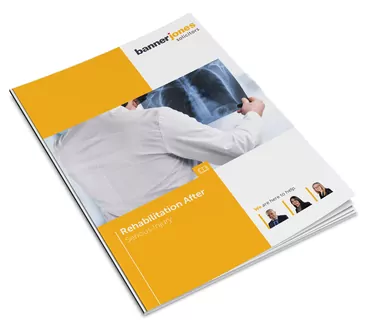If yourself, or someone you know, has suffered a serious injury then early rehabilitation will inevitably play a key part in speeding up recovery. Our specialist personal injury solicitors will look to work with the defendant’s insurers under the rehabilitation code, agreeing and implementing an effective rehabilitation plan.
Starting rehabilitation
It is important to start rehabilitation as soon as possible after the injury to give yourself the best chance of a full recovery and therefore aiding an early return to work (where applicable). In serious injury cases your solicitor will appoint a professional case manager to ensure the most appropriate rehabilitation plan is put in place for both your physical and psychological injuries. In some cases this will happen even before you are discharged from hospital.
Job support
If you are currently employed, your solicitor and/or case manager will liaise with your employer to ensure that your job stays open as long as possible. They will also help to ensure that any relevant adjustments or adaptations are made to the workplace, which may include a phased return to work.
How much will rehabilitation cost?
The cost of rehabilitation is generally met by the defendant’s insurers or sometimes the cost can be included as part of
your compensation claim.
Second opinion
If you are not satisfied with the way your case is being handled by your current solicitor, you can change at no cost to you. Serious injury cases need to be dealt with by solicitors who really understand the complexity of the injuries and can therefore help you get the best possible rehabilitation and maximise your compensation. If you’re not sure how to go about changing solicitor, we are here to help.
Types of rehabilitation
Rehabilitation can take many forms and this will depend on the nature and seriousness of your injuries. It may well involve many different professionals working together with you. Some types of rehabilitation which may be available for you:
Physiotherapy
This is one of the more common rehabilitation services as physical therapy may help your body recover some function. This can also involve a physical fitness regime to help you recover your physical fitness and health.
Provision of equipment in the home and workplace
This can include adaptations and modifications to enable you to move around as independently as possible while at home and at your place of work. Accommodation adjustments such as ramps, walk in showers, raised toilet seats, handrails, widened doors and lowered light switches may all be necessary and we can help to sort this for you.
Ongoing treatment
Ongoing treatment may be required such as speech and occupational therapy.
Counselling
Psychological counselling is often necessary to help with the trauma of the injury. There are different types of counselling and psychotherapy, and we can help you to find the right one for you.
Nursing care
Nursing care may be required to help you in the home.
Respite for family
Looking after a loved one can be very tiring and stressful so family respite time can be arranged as part of the process.
Transport adjustments
Transport adjustments, such as vehicle adaptations may help you to get around more easily by yourself, allowing you to retain your independence.
Retraining
Retraining for alternative employment may be required if you are no longer able to go back to your previous line of work because of your injury and it’s effects.

- Chartered Legal Executive
- Head of Personal Injury



